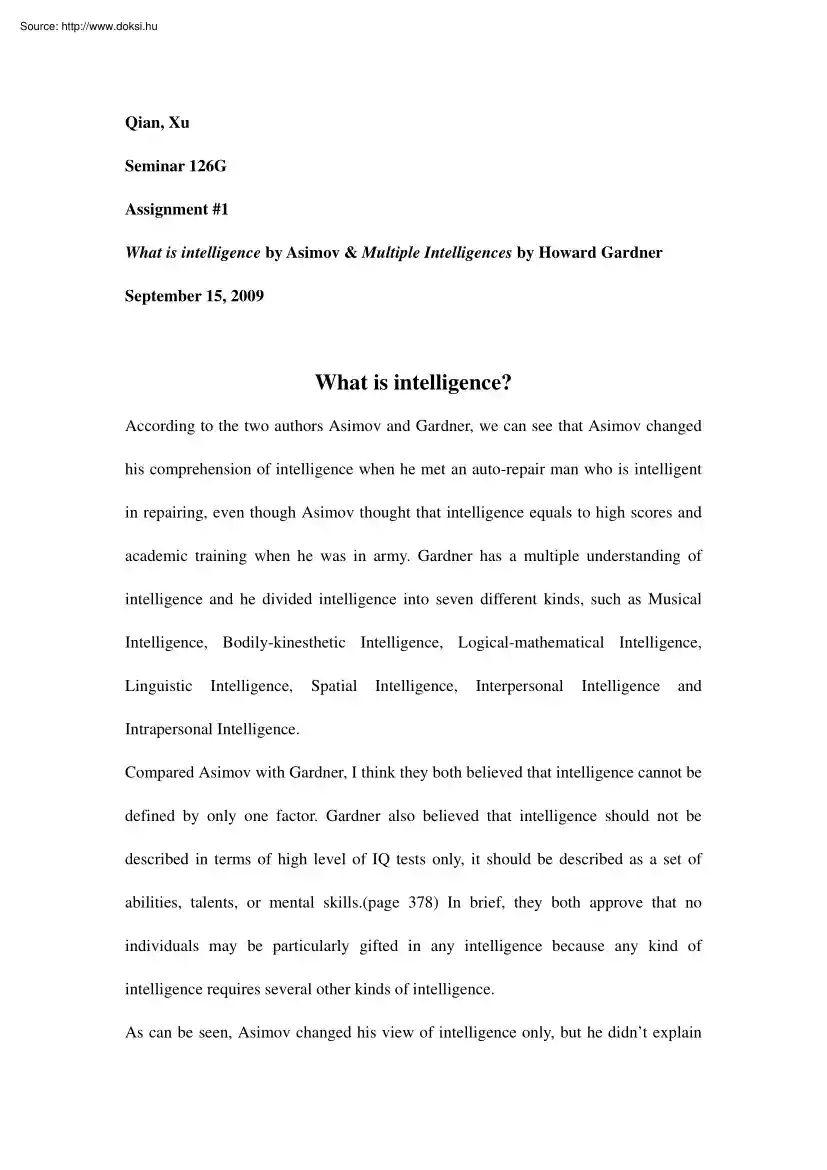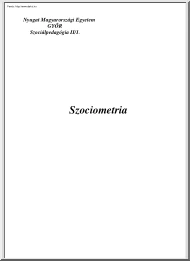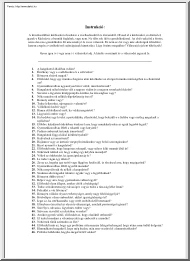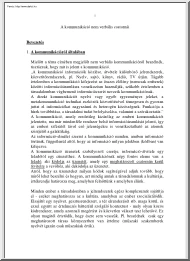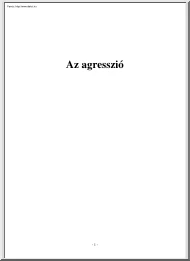Datasheet
Year, pagecount:2009, 3 page(s)
Language:English
Downloads:10
Uploaded:April 28, 2013
Size:18 KB
Institution:
-
Comments:
Attachment:-
Download in PDF:Please log in!
Comments
No comments yet. You can be the first!Most popular documents in this category
Content extract
Qian, Xu Seminar 126G Assignment #1 What is intelligence by Asimov & Multiple Intelligences by Howard Gardner September 15, 2009 What is intelligence? According to the two authors Asimov and Gardner, we can see that Asimov changed his comprehension of intelligence when he met an auto-repair man who is intelligent in repairing, even though Asimov thought that intelligence equals to high scores and academic training when he was in army. Gardner has a multiple understanding of intelligence and he divided intelligence into seven different kinds, such as Musical Intelligence, Bodily-kinesthetic Intelligence, Logical-mathematical Intelligence, Linguistic Intelligence, Spatial Intelligence, Interpersonal Intelligence and Intrapersonal Intelligence. Compared Asimov with Gardner, I think they both believed that intelligence cannot be defined by only one factor. Gardner also believed that intelligence should not be described in terms of high level of IQ tests only, it should be
described as a set of abilities, talents, or mental skills.(page 378) In brief, they both approve that no individuals may be particularly gifted in any intelligence because any kind of intelligence requires several other kinds of intelligence. As can be seen, Asimov changed his view of intelligence only, but he didn’t explain clearly why high scores in school tests should not be the only standard of evaluating intelligence. Contrasted Gardner with Asimov, he explain the differences between traditional view of intelligence and the MI(multiple intelligence). Gardner said, ‘in a traditional view, intelligence is defined operationally as the ability to answer items on tests of intelligence,’ however ‘multiple intelligence entails the ability to solve problems or fashion products that are of consequence in a particular cultural settings or community.’(page 379) In my own opinion, I really think that intelligence is a word which covers thousands of words, such as talent,
knowledge, confidence and interests. In other hand, I feel that intelligence maybe divided into two different parts, formal intelligence which is more academic and theoretical and informal intelligence which is more talented and practical. Formal intelligence contains many different fields, such as building knowledge, accepting useful information and getting academic training. In chief, it is a kind of nurture, a process which should be trained and educated. Building knowledge and information is important, because people can know many different things in this world if he become knowledgeable and he can use all knowledge to improve his interests and then he could be an intelligent person in the area he likes. In terms of academic training, I agree with Gardner that intelligence could be recognized in advance of formal training and social cooperation may be an very essential part of formal intelligence. For example, Helen Keller, the blind and deaf greatest author, found her intelligence
in writing and became more and more happy by receiving some formal training from her teacher, such as how to feel what is water, when she was very young. So, mostly, formal training is a way to help yourself to find your own intelligence. Additionally, many different parts comprise the informal intelligence. The most obvious word which is exactly connected to intelligence is talent. Talent is nature, the gift people already have when people are born. Furthermore, interest and confidence are another two factors which can influent one’s intelligence. Because if people find their correct interests, they will have more interests in doing the things they loved and then people get more and more achievements which encourage them more confident and intelligent in this area. Surroundings and environment inhabit crucial states in intelligence, because environment people lived will influent their characteristics imperceptibly. For instance, if you were born in a artist’s family, you have
to accept many information about arts because your parents talk about arts everyday. Then when you grow up, you may be a talent artist in that atmosphere. In conclusion, I firmly believed that intelligence is independent. Three are huge fluctuations between different individual’s intelligence because any individual has different characteristic and any individual achievement occurred in different social standard. Additionally, as Gardner separating human’s brain into several regions which control different intelligence, I agree with him that it becomes important to consider individuals as a collection of aptitudes rather than as having a singular problem-solving faculty. However, the fluctuations of intelligence between different individuals are inevitable
described as a set of abilities, talents, or mental skills.(page 378) In brief, they both approve that no individuals may be particularly gifted in any intelligence because any kind of intelligence requires several other kinds of intelligence. As can be seen, Asimov changed his view of intelligence only, but he didn’t explain clearly why high scores in school tests should not be the only standard of evaluating intelligence. Contrasted Gardner with Asimov, he explain the differences between traditional view of intelligence and the MI(multiple intelligence). Gardner said, ‘in a traditional view, intelligence is defined operationally as the ability to answer items on tests of intelligence,’ however ‘multiple intelligence entails the ability to solve problems or fashion products that are of consequence in a particular cultural settings or community.’(page 379) In my own opinion, I really think that intelligence is a word which covers thousands of words, such as talent,
knowledge, confidence and interests. In other hand, I feel that intelligence maybe divided into two different parts, formal intelligence which is more academic and theoretical and informal intelligence which is more talented and practical. Formal intelligence contains many different fields, such as building knowledge, accepting useful information and getting academic training. In chief, it is a kind of nurture, a process which should be trained and educated. Building knowledge and information is important, because people can know many different things in this world if he become knowledgeable and he can use all knowledge to improve his interests and then he could be an intelligent person in the area he likes. In terms of academic training, I agree with Gardner that intelligence could be recognized in advance of formal training and social cooperation may be an very essential part of formal intelligence. For example, Helen Keller, the blind and deaf greatest author, found her intelligence
in writing and became more and more happy by receiving some formal training from her teacher, such as how to feel what is water, when she was very young. So, mostly, formal training is a way to help yourself to find your own intelligence. Additionally, many different parts comprise the informal intelligence. The most obvious word which is exactly connected to intelligence is talent. Talent is nature, the gift people already have when people are born. Furthermore, interest and confidence are another two factors which can influent one’s intelligence. Because if people find their correct interests, they will have more interests in doing the things they loved and then people get more and more achievements which encourage them more confident and intelligent in this area. Surroundings and environment inhabit crucial states in intelligence, because environment people lived will influent their characteristics imperceptibly. For instance, if you were born in a artist’s family, you have
to accept many information about arts because your parents talk about arts everyday. Then when you grow up, you may be a talent artist in that atmosphere. In conclusion, I firmly believed that intelligence is independent. Three are huge fluctuations between different individual’s intelligence because any individual has different characteristic and any individual achievement occurred in different social standard. Additionally, as Gardner separating human’s brain into several regions which control different intelligence, I agree with him that it becomes important to consider individuals as a collection of aptitudes rather than as having a singular problem-solving faculty. However, the fluctuations of intelligence between different individuals are inevitable
